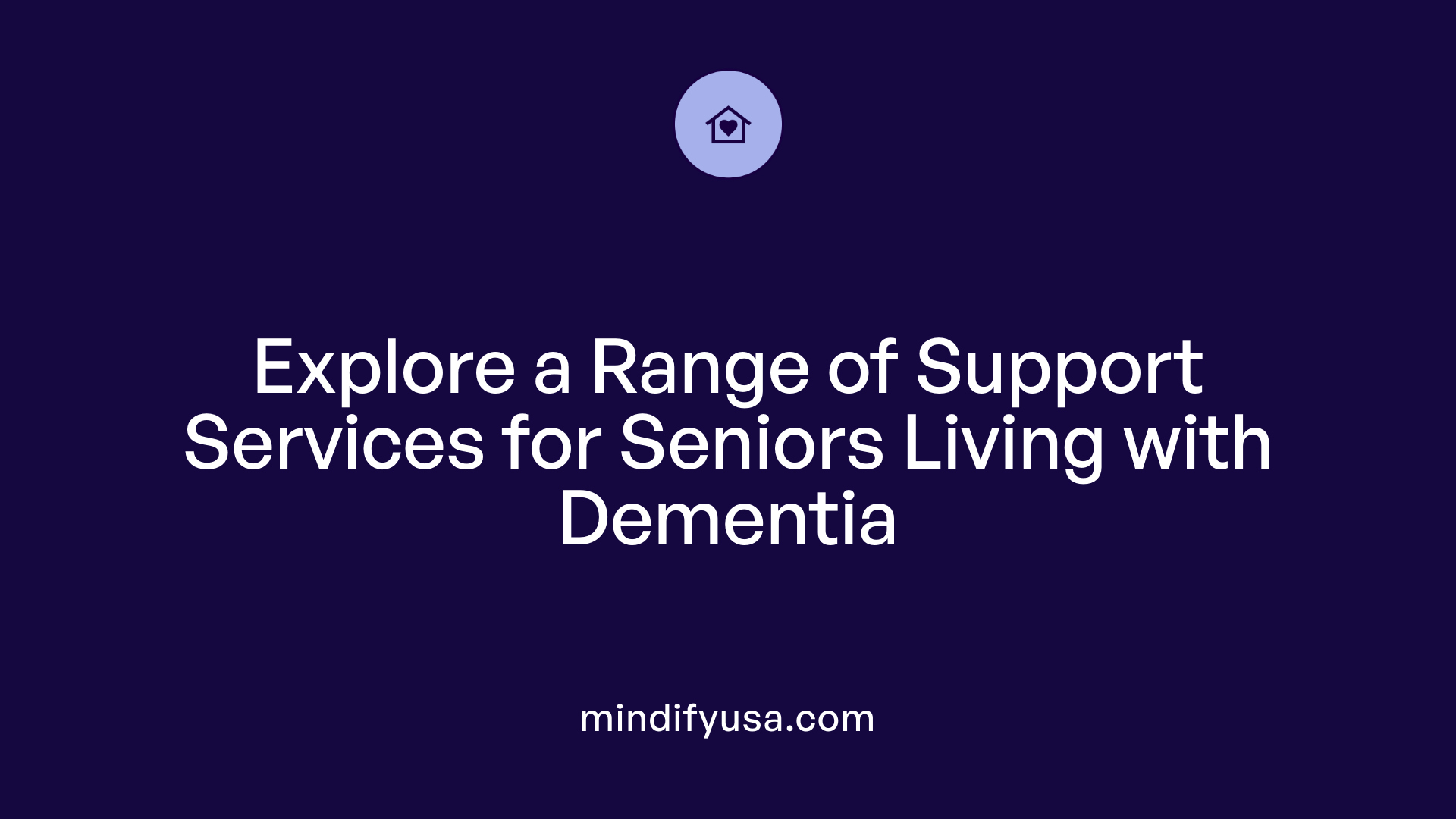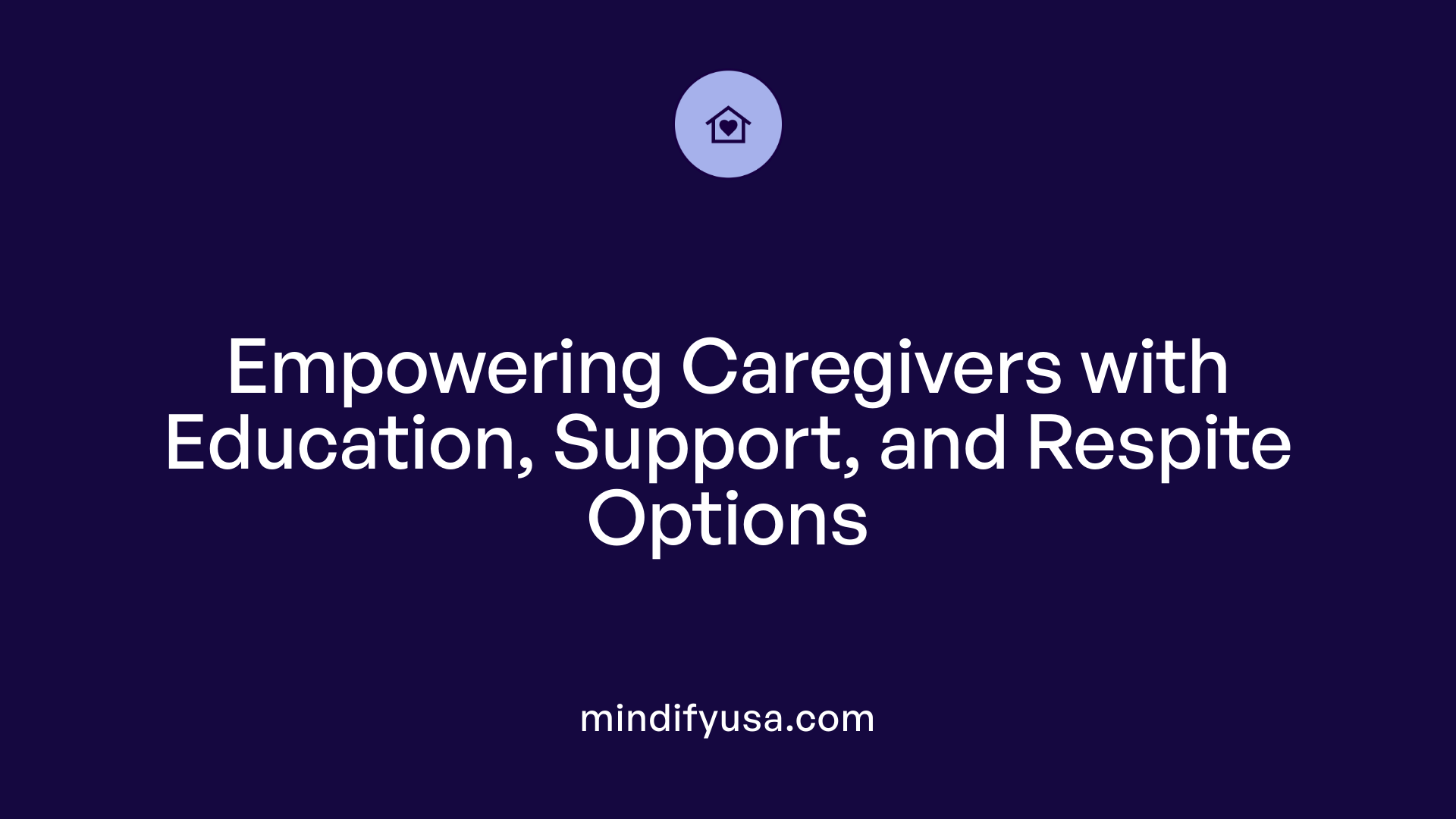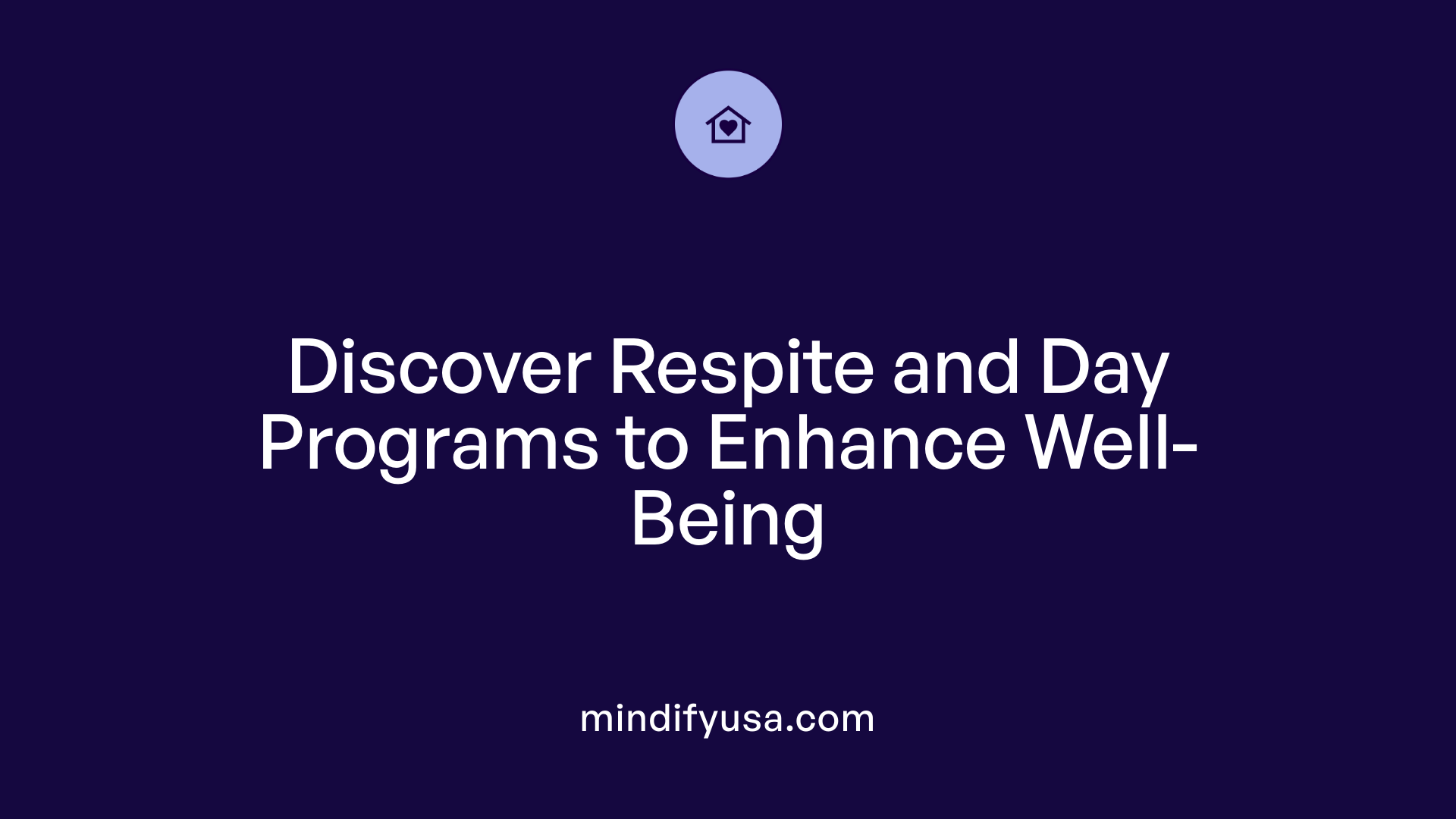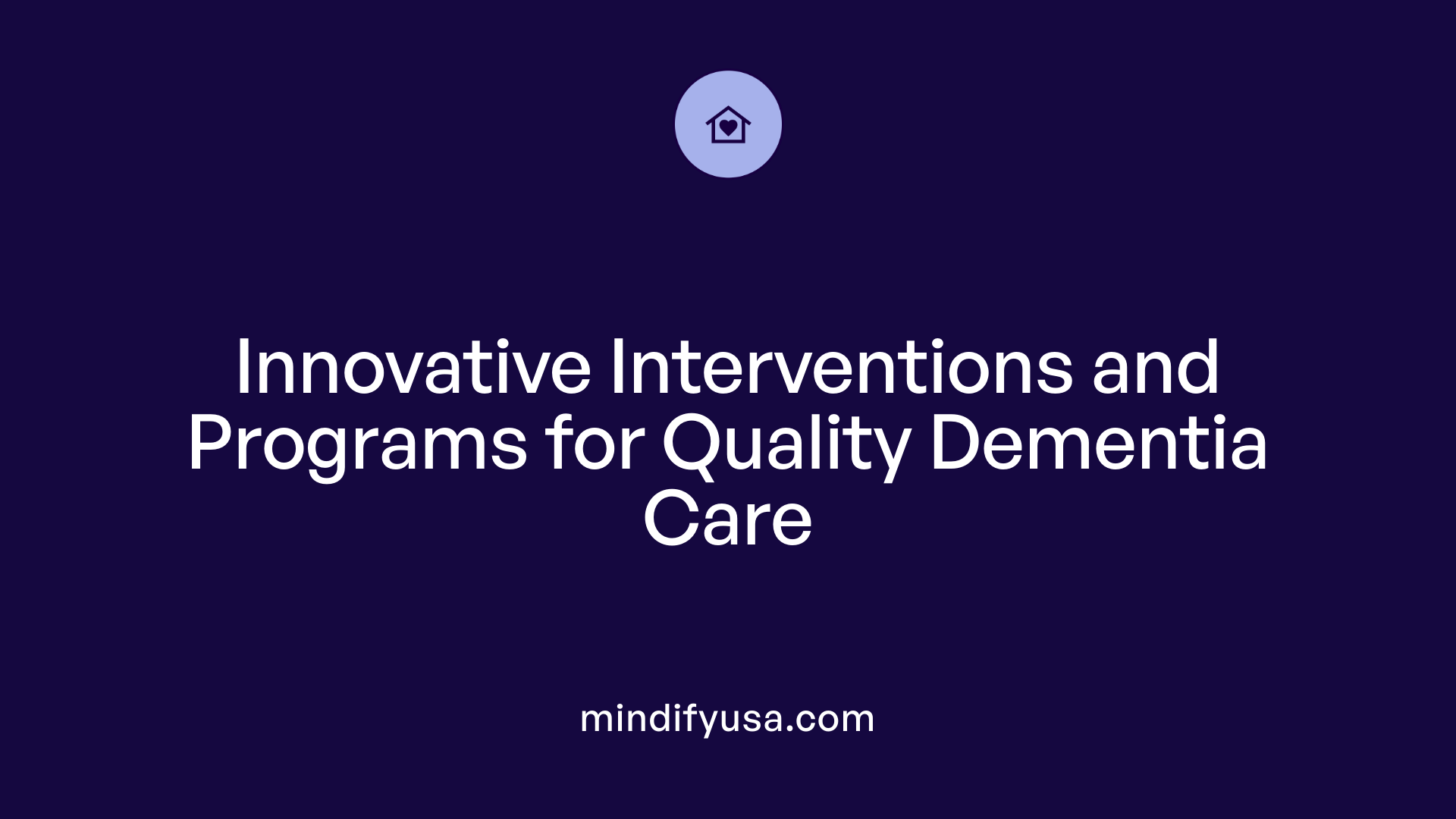Empowering Seniors and Supporting Caregivers through Specialized Services
Mindify offers a wide array of services and programs tailored to meet the unique needs of seniors with dementia and their families. From day programs and respite care to mental health support and educational resources, Mindify is committed to enhancing quality of life and providing essential assistance for this vulnerable population.
Holistic Support Services for Seniors with Dementia

What support options and services are available for seniors with dementia?
Support for seniors living with dementia is designed to address the complex needs of individuals at various stages of the disease. These options range from in-home care to long-term residential facilities, ensuring that each person receives personalized care.
Home-based care is a primary resource, providing assistance with daily activities such as bathing, dressing, and meal preparation. Often, this care is delivered by family members, friends, licensed home health agencies, or through programs like Meals on Wheels that deliver nutritious meals directly to the home. For those needing more extensive support, long-term care options include assisted living facilities, nursing homes, and continuing care retirement communities. These settings offer 24-hour supervision and medical support, accommodating changing needs over time.
Community resources are crucial in the continuum of care. Adult day centers offer a safe environment for socialization, structured activities, and health monitoring during the day, giving caregivers much-needed respite. Respite services provide temporary relief, allowing caregivers to rest while seniors receive supervision and companionship.
For more intensive supervision, residential care options such as assisted living and nursing homes ensure appropriate care levels. Specialized programs also exist, like the Alzheimer’s Association’s support initiatives, that provide education, emotional support, and care coordination. These programs can be accessed online, via helplines, or through local organizations.
Government programs play a vital role in helping seniors and their families manage costs. Medicaid and Medicare provide coverage for various services, including home health care and residential stays. The Program of All-Inclusive Care for the Elderly (PACE) offers comprehensive services, from transportation and medication management to personal care and social activities, often at reduced or no cost to eligible participants.
To navigate these resources, individuals can consult healthcare providers, geriatric care managers, or social workers. Many reputable organizations, like the Alzheimer’s Alliance or federal initiatives, facilitate access to programs and services tailored to older adults facing cognitive decline.
| Service Type | Description | Who It Helps |
|---|---|---|
| In-home support | Assistance with daily activities, meal delivery | Seniors needing help at home |
| Adult day centers | Supervised social activities, health monitoring | Early to middle-stage dementia |
| Respite services | Temporary relief for caregivers | Family caregivers |
| Residential care | Assisted living, nursing homes | Those requiring 24/7 supervision |
| Support programs | Education, counseling, helpline access | Families and caregivers |
| Government coverage | Medicaid, Medicare, PACE | Low-income or qualifying seniors |
For families seeking more information on available support systems and resources at Mindify, the website offers extensive guidance. Exploring these options can significantly improve quality of life and provide peace of mind for both seniors and their loved ones.
Care Programs and Activities Enhancing Cognitive and Emotional Well-being
What care programs and activities are available for seniors with dementia?
Dementia care programs and activities are designed to support both the cognitive functions and emotional health of individuals at different stages of the condition. These programs are flexible and tailored, aiming to promote engagement, safety, and well-being.
Physical activities such as walking, gardening, dancing, and chair yoga play a vital role in maintaining mobility and fostering a sense of accomplishment and enjoyment. These activities are often incorporated into adult day centers and community programs, providing safe environments for participation.
Social engagement is equally important to reduce feelings of loneliness and depression. Community events like game nights, interest clubs, holiday celebrations, and group outings encourage interaction and foster a sense of belonging.
Creative and sensory stimulation activities help soothe and engage the senses, especially in later stages. Activities like music therapy, arts and crafts, reminiscence sessions with photo albums, and multisensory stimulation boxes create opportunities for emotional expression and comfort.
Memory care communities often offer structured programs including art classes, brain games, and personalized reminiscence activities designed to stimulate mental activity and preserve memories. Use of technology, such as virtual tours or virtual reality (VR), enriches these experiences.
Across different care options—from adult day centers to residential and hospice care—programs are continuously evolving to meet individual needs. Support from healthcare providers, community resources, and nonprofit organizations like the Alzheimer’s Association further enhances the scope and quality of available activities.
The diversity in offerings ensures that seniors with dementia can find meaningful, enjoyable ways to maintain their dignity and quality of life through tailored engagement.
Supporting Caregivers through Education and Respite Services

What support do caregivers of seniors with dementia receive?
Caregivers who care for seniors with dementia can access a broad range of support services designed to ease their responsibilities and improve the quality of care. Many organizations, including reputable entities like the Alzheimer’s Association and local community programs, offer support groups where caregivers can share experiences, gain emotional support, and learn practical caregiving tips.
Educational resources are available online and through workshops to help caregivers understand dementia better, manage behavioral symptoms, and plan for the future. This education is essential, as it empowers caregivers with knowledge to handle complex situations confidently.
Respite care services provide temporary relief by offering short-term care options. These services can include adult day centers, in-home assistance, or caregiver relief programs. They allow caregivers to rest, attend to personal matters, or simply take a break, reducing burnout and stress.
Legal and financial planning are also crucial aspects of caregiving. Resources that help with advance directives, power of attorney, and managing healthcare costs are accessible through community organizations and online platforms. Such tools aid in making informed decisions and ensuring the well-being of both the caregiver and the person with dementia.
Accessing these services typically involves coordination with local social workers, community health agencies, and national organizations, all committed to providing comprehensive support tailored to each family’s needs.
| Service Type | Description | Supporting Organization |
|---|---|---|
| Support Groups | Peer-led or professional-led groups for emotional support | Alzheimer’s Association, local community centers |
| Educational Resources | Workshops, online courses, and webinars | Alzheimer’s Foundation, Mindify Wellness and Care |
| Respite Care | Short-term relief via adult day centers or in-home services | Local providers, community health agencies |
| Legal & Financial Planning | Assistance with healthcare directives, budgeting, and costs | Social workers, elder law attorneys |
| Community Support | Access to counseling, home health, and social services | State and local programs |
For caregivers seeking assistance, resources like the Mindify website provide detailed information about available services, helping families navigate the ever-expanding landscape of dementia care support.
Respite and Day Programs Tailored for Seniors with Dementia

Are there respite and day program services available for seniors with dementia?
Yes, there are many options designed to support seniors with dementia and their families. Adult day centers and specialized Alzheimer’s day care programs serve as safe, engaging environments where individuals can participate in various activities tailored to their cognitive and physical needs.
These programs typically include social activities, therapeutic exercises, and mental stimulation such as music, art, and games. They also often provide health screenings, personal care, medication reminders, and nutritious meals or snacks. Transportation services are frequently available to help seniors arrive and leave these centers comfortably.
For caregivers, these programs offer much-needed relief, often including caregiver support groups and additional resources. The goal is to improve quality of life for seniors while providing peace of mind for their families.
Providers like Live Oak Adult Day Services, the Alzheimer’s Activity Center, and Visiting Angels focus on enhancing mental and physical well-being, ensuring safety through measures like secure alarms, and customizing care approaches to individual needs.
Many of these programs are licensed and consider financial assistance options, such as sliding scale fees, to make these beneficial services more accessible.
In summary, day programs and respite services are vital components of community support for seniors with dementia, fostering social engagement, health, and caregiver relief.
Specialized Interventions and Programs for Dementia Care

What interventions and specialized programs are offered for seniors with dementia?
Seniors with dementia benefit from a broad spectrum of interventions aimed at improving their quality of life and maintaining their independence. Psychosocial therapies play a significant role in these programs. Cognitive Stimulation Therapy (CST), reminiscence therapy, validation therapy, and reality orientation are common approaches. These therapies are designed to strengthen cognitive skills, reinforce memories, and foster emotional well-being.
Non-pharmacological strategies are equally important. Activities such as music therapy, pet therapy, aromatherapy, and multisensory stimulation have been shown to reduce agitation, elevate mood, and promote relaxation. Structured activities tailored to individual preferences can provide meaningful engagement and reduce behavioral challenges.
Environmental modifications and occupational therapy are also critical components of care. Making adjustments like simplifying home environments, reducing clutter, and establishing predictable routines help improve safety and ease daily tasks. Occupational therapists often work with caregivers to develop personalized strategies that enhance safety and independence.
In addition to these therapies, physical exercise adapted to the senior’s abilities can be beneficial. Regular activity may alleviate symptoms of depression and manage challenging behaviors. Combining these interventions with appropriate medical treatment forms a comprehensive approach. This multidisciplinary plan addresses the complex needs of those with dementia, aiming to support both their physical and emotional health.
Financial Support and Resources for Long-Term Care
Coverage options through Medicare, Medicaid, and private insurance
Medicare provides limited support for individuals with dementia. It covers outpatient cognitive testing, some care planning, and treatments or medications under Part B and Part D. However, Medicare generally does not cover the costs associated with assisted living or long-term memory care, which include room, board, and ongoing personal care. For these services, many families turn to Medicaid, private insurance, or personal savings.
Medicaid is the primary program that helps cover long-term care needs. It offers nursing home care and may assist with in-home support services, which are essential for many individuals with dementia. Eligibility depends on income and assets, and certain programs may vary by state.
Private insurance plans typically do not include long-term custodial care, but some long-term care insurance policies can help offset costs for assisted living, adult day programs, or home care.
Community-based programs like PACE
The Program of All-Inclusive Care for the Elderly (PACE) is a notable community-based option. PACE provides comprehensive services that include medical, social, transportation, personal care, and meals, tailored for seniors who need a combination of health and personal assistance. PACE is especially valuable for older adults with complex conditions like dementia, offering a holistic approach that helps delay or avoid more intensive long-term care placement.
Legal resources and support services
Legal resources are also available to help plan for future care needs. Through organizations like the Alzheimer’s Association and local legal aid services, families can access assistance with durable power of attorney, healthcare directives, and guardianship. Support services such as caregiver training, respite care grants, and educational programs are designed to ease the financial and emotional burden of caregiving.
In summary, while Medicare offers some support, most long-term dementia care relies on Medicaid, community programs like PACE, and private resources. Planning early for these options can help families manage costs and secure the appropriate care environments.
| Coverage Source | Services Covered | Typical Cost Support | Additional Notes |
|---|---|---|---|
| Medicare | Outpatient tests, medications | Limited, outpatient services | Does not cover residential or long-term custodial care |
| Medicaid | Nursing home, home care | Varies by state, often substantial | Primary support for long-term residential care |
| Private Insurance | Long-term care policies | Depends on policy | May cover assisted living if policies include it |
| PACE | Medical, social, personal care | All-inclusive, based on assessment | Suitable for those with high care needs |
Ensuring Quality of Life for Seniors with Dementia
Mindify’s comprehensive array of services and programs underscores its commitment to supporting seniors with dementia and their caregivers. Through innovative care models, supportive community programs, educational resources, and financial assistance options, Mindify aims to foster dignity, independence, and well-being, making a significant difference in the lives of those affected by dementia.
References
- Finding Dementia Care and Local Services - Alzheimers.gov
- Dementia Friendly - NCTCOG
- Mindify Wellness And Care hiring Licensed Mental Health ...
- Adult Day Services - Office on Aging
- Alzheimer's Disease and Related Dementias | dacl
- Adult Day Care Programs in Southeast Michigan | AgeWays
- Care Partner Supports | Department of Health and Human Services






































































































